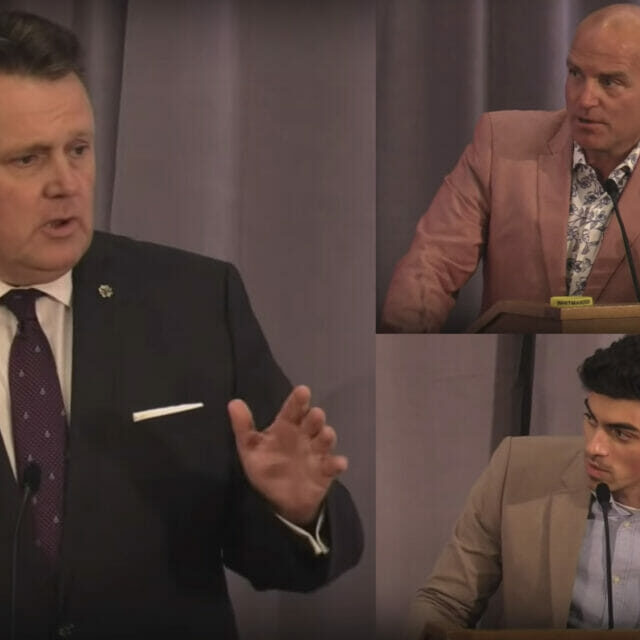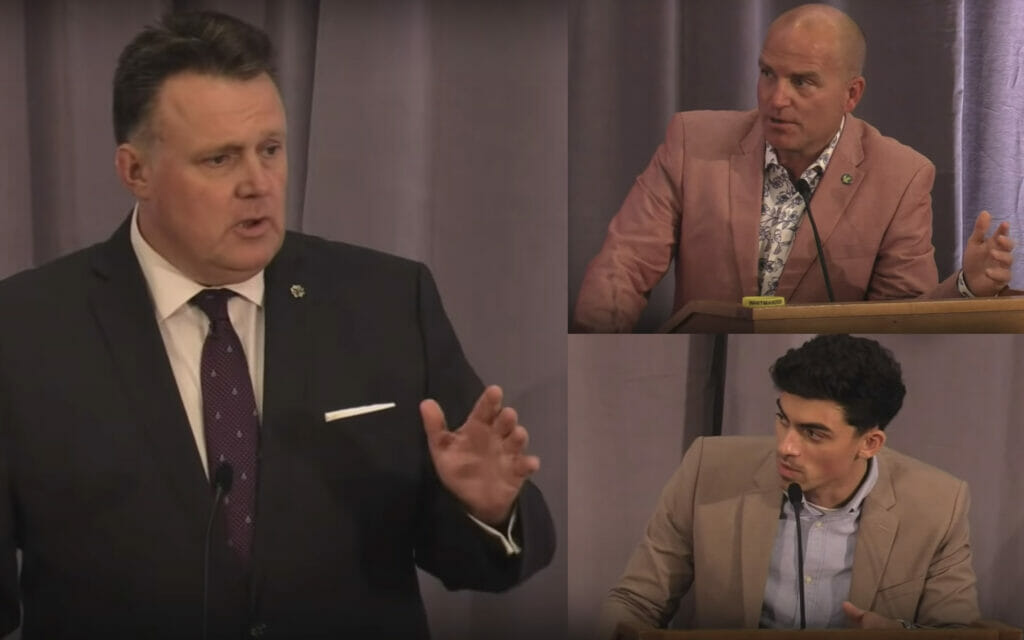
A guide to Halifax’s 2020 mayoral candidates
Surprise: they’re three white men

Matt Whitman
Councillor Matt Whitman is the second most experienced candidate in the race. He was elected to represent the municipal office of District 13 Hammonds Plains-St. Margarets in 2012. In 2015, his colleagues elected him as deputy mayor for a one-year term. He was born and raised in the Halifax Regional Municipality (HRM) and graduated from Saint Mary’s University in 1992.
1) Policing: Whitman is a supporter of the Halifax Regional Police (HRP). When the question of defunding the police was raised at the mayoral candidates’ debate on Sept. 16 he said, “If you don’t stand with the police, stand in front of them.”
At the same debate, he said police should wear body cameras and the smoking-ban, which makes it illegal to smoke or vape outside of designated smoking spots in the municipality, should be more widely enforced.
2) Indigenous issues: At the Sept. 16 debate, Whitman was asked how he’ll work with Indigenous people considering his past stance to keep the statue of Edward Cornwallis in Cornwallis Park. (Cornwallis was a former governor of Nova Scotia and once issued a proclamation to expel all Mi’kmaw people from the peninsula.) Whitman remained steadfast and said the municipality should have more statues.
3) Climate change: Whitman would like to reduce the number of single occupancy vehicles on the road while improving Halifax’s transit infrastructure. He has no specific plans outlined as to how to do this.
4) Poverty and affordable housing: Whitman plans to improve affordable housing by speeding up the permit process, which will allow developers to create affordable housing projects faster. The process will be expedited by “reducing red tape,” according to his website. He is opposed to rent control as it sacrifices a free-market system.
5) COVID-19 recovery and local business: Whitman says he will focus on “protecting your tax dollars,” according to his website. As mayor, he says he’ll immediately freeze his salary for as long as he is mayor in hopes that other departments will be inspired to tighten their budgets.
At the Sept. 16 debate, Whitman criticized the city government’s decision to waive street parking and transit fees for a period during the pandemic. He also said Plexiglas should have been installed on busses immediately.
What else do you need to know: While serving on Halifax regional council, Whitman’s tenure has been among the most controversial especially in the last four years.
In 2017, Whitman uploaded a video to his YouTube channel that sparked controversy. In the video, Whitman and a passenger are sitting in a car when Whitman yells “Chinese fire drill.” He and the passenger then run around the car before re-entering and sitting in different seats. After people began tweeting that Whitman’s remark was racist, he removed the video. In October 2017, Whitman used the word “Negro” in a televised interview on CTV Atlantic News, which sparked much criticism.
In 2018, Whitman once again placed himself in the spotlight by retweeting a post by a white supremacist group, ID Canada, that denounced the municipal government’s decision to remove the statue of Edward Cornwallis from Cornwallis park. Whitman claimed to have no knowledge of ID Canada’s white supremacist views prior to the backlash toward his retweet. He then deleted the tweet and blocked ID Canada from his account.
Later in 2018, Whitman was removed from all city committees for three months for breaching the code of conduct.
Mike Savage
The incumbent, Mayor Mike Savage was elected to his office in 2012 and 2016. Prior to that, from 2004 to 2011 he was a member of parliament for the Liberal Party of Canada. Born in Belfast, Northern Ireland, Savage was raised in Dartmouth and graduated from Dalhousie University. His father, John Savage, served as premier of Nova Scotia between 1993 and 1997.
1) Policing: Savage supports the Black Lives Matter movement and recently established the HRM’s Office of Diversity and Inclusion and the African Nova Scotian Affairs Integration Office.
He recently redirected funds used to purchase a HRP armoured vehicle to the Office of Diversity and Inclusion and the non-police Public Safety Office, with remaining funds to be directed toward municipal programs and services to counter anti-Black racism.
Savage wants to improve the inclusion of African Nova Scotian and Black voices in the decisions made at city hall. He would like to see Wortley report at council and within the HRP. The Wortley report, released in March 2019 by the NS Human Rights Commision, showed a Black citizen was six times more likely to be street checked in Halifax than a white citizen. The report includes multiple policy recommendations for improving the relationship between the police and the African-Nova Scotian community.
2) Indigenous issues: Savage wants to increase the amount of Mi’kmaw history, culture and art visible in public spaces throughout the city. He plans to implement recommendations from the Task Force on the Commemoration of Edward Cornwallis and the Recognition and Commemoration of Indigenous History in consultation and partnership with the Assembly of Nova Scotia Mi’kmaw Chiefs. He would like to support a new Mi’kmaw Native Friendship Centre in the city.
3) Climate change: Savage wants to implement HalifACT: a climate change strategy with targets for 2050. He would like to work with the province in creating a new coastal protection act. He wants to ensure the boundaries of the Blue Mountain Birch Cove Lakes Wilderness Park, a proposed urban park, “reflect the potential of that space,” according to his website.
4) Poverty and affordable housing: Savage wants to expand the HRM’s Affordable Access Program. (People can apply to the program to get subsidies for buying transit passes or paying for children’s recreation programs.) He says he will take action to ensure the HRM pays its employees a livable wage. He wants to create new and refurbished affordable housing through partnerships with local developers.
5) COVID-19 recovery and local business: Savage wants to continue adapting Halifax community spaces to accommodate social distancing, such as expanding sidewalks. He would also like to figure out ways to capitalize on Atlantic bubble tourism in the short term. He wants to continue fostering start-ups and scale-ups.
What else should you know: Though there’s still time for Mayor Savage to cement his legacy in Halifax, he may be best remembered for the removal of the Edward Cornwallis statue.
In 1993, Mi’kmaw historian Daniel Paul brought attention to Cornwallis’s racist views and actions through his book We Were Not the Savages. Paul lobbied for Cornwallis’s statue to be removed, as well as to change the name of Cornwallis Street, Cornwallis Park and Cornwallis Junior High School. The school was renamed in 2011 as Halifax Central Junior High. The decision to remove the statue was finally considered in 2017 when protesters reportedly planned to tear down the statue, causing concern for public safety within council. After a 12-4 vote in 2018, the statue was officially removed.
Max Taylor
A late entry to the race, the 22-year-old Taylor announced his candidacy on Sept. 8. He has no experience in public office, but he is popular on TikTok, where he has more than 650,000 followers.
Campaign promises:
While Taylor gave genuine answers at the candidates’ debate on Sept. 16, he has no campaign website, just a Facebook page. On the “About” section of the page, he writes that his platform is simply this: “I don’t care who you vote for, I care that you vote.”
What else should you know:
If Taylor wins, he wouldn’t be the youngest mayor in Canadian history. That honour is reserved for Clayton Smith, who became the mayor of New Norway, Alberta when he was 19 years old.
Correction: The original version of this story, published in Issue 3, Vol. 153 of the Dalhousie Gazette, stated Mike Savage was born in Belfast, Ireland. Belfast is in fact the capital of Northern Ireland. The Gazette apologizes for this mistake.






